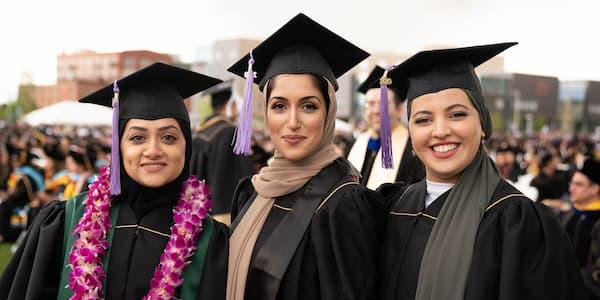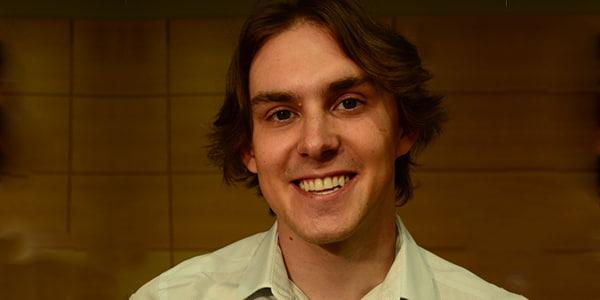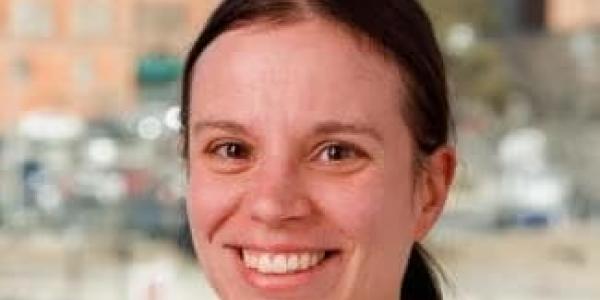Chemistry is
The Alchemy of Now
Interested? Request more information
Credit hours: 120
Full-time, part-time
on-campus
Start terms: fall, spring, summer
Humans have been fascinated by the transformation of substances for thousands of years.
From the first time humans applied heat to raw food to the complex research conducted in laboratories of today, chemistry can be found almost everywhere: an exciting world of how molecules interact with each other and their surroundings. The University of Colorado Denver’s Department of Chemistry gives you not only an exciting look into how molecules interact with each other and their surroundings, but also grants you your ticket into this world and fascinating career path.
Choose between a Bachelor of Science in chemistry—with or without certification from the American Chemical Society, or biochemistry.
Is Chemistry right for me?
Are you obsessed with how things work on a molecular level? Do you have a periodic table of elements hanging in your room right now—or you don’t even need one because you’ve already memorized it? Can you rattle off all the tools and instruments necessary for conducting a chemical experiment? Most importantly, does the study of the properties and interactions between physical substances fascinate you without pesky living organisms getting in the way?
Chemistry is a great pathway for you if you identify with any of the above, or if you’re interested in a plethora of possible future careers including forensic chemistry in a police lab, nanotechnology, chemical engineering, quality control, or research and development.
Here you’re going to get real experience—and not just cleaning lab equipment. You'll gain hands-on experience by doing. By the time you graduate, you’ll be ready to work in a lab.
As a chemistry student, you have the option to take a few more classes and graduate American Chemical Society (ACS) certified.
Is Biochemistry right for me?
Are you looking for a career in medicine or health? Does developing new pharmaceuticals sound exciting to you? With a Bachelor of Science in Biochemistry, you’ll set off on a path where you not only know chemical interactions and you’ll explore and fully understand why interactions are happening the way they do in the body. This is invaluable to you if you get to a point in your field where you are developing a drug.
Our Biochemistry program will set you apart. We have a close working relationship with Anschutz Medical Campus and, as a result, we get the chance to offer students like you research opportunities that will pad your resume and give you in-lab experience during your undergraduate academic career.
Careers
From healthcare to forensics, careers in chemistry and biochemistry give you an incredible range of choice for whatever you choose as your next step. Careers our grads have:
Chemistry is a growing career area
Research different degrees and career trajectories at DataUSA.io
(Screenshot—April 2024)
- Quality Assurance or Quality Control
- Medical Doctors
- Pharmacists
- Drug Development
- Academia/Higher Education
- Dental Care
- Forensic Science
- K-12 Education
- Flavor Chemists “Flavorists”
- Biotechnology
- Agricultural Chemist
- Science or Technical Writer
- Hazardous Waste Management
- Public Health
- Nanochemistry
- Toxicology
- Research and Development
- Environmental Chemistry
- Crystallography
You will major in either
- Chemistry—the study of matter, analyzing its structure, properties and behaviour to see what happens when they change in chemical reactions
- Biochemistry—the study of chemical and physicochemical processes and substances that occur within living organisms
Majoring in Chemistry: 66-72 hours
Course topics include:
- General chemistry
- Inorganic and organic chemistry
- Instrumental analysis
- Physical chemistry
- Thermodynamics
- Kinetics
- Quantum mechanics
- Spectroscopy
Additionally you will take courses in physics and calculus.
Additionally, you may become American Chemistry Society (ACS) Certified with a couple of additional courses in biochemistry and upper specific upper division courses.
Majoring in Biochemistry: 74 hours
Course topics include:
- Biochemistry
- Reaction analysis
- Molucular structures
- Molecular Informatics
- General chemistry
- Organic chemistry
- Instrumental analysis
- Physical chemistry
- Thermodynamics
- Kinetics
- Spectroscopy
Additionally you will take courses in biology, physics, and calculus.
CU Denver Core: 34-40 Hours
You’ll be educated in
- English and mathematics
- international and cultural diversity perspectives
- arts and humanities
- behavioral, physical, and social sciences
College of Liberal Arts and Science Core—15 Hours
These courses give you a better understanding of the issues and skills you need to succeed.
Topics include:
- Logic, Language, and Scientific Reasoning
- Psychology
- Writing for the Sciences
- Public Health
Add a minor in Chemistry or Biochemistry to your degree by completing specified coursework. You will need to see your CLAS advisor to declare this minor.
Chemistry minor: 24 hours
Topics include:
- General chemistry and lab
- Organic chemistry and lab
Learn more about the Chemistry minor
Biochemistry minor: 25 hours
Topics include:
- Biochemistry and lab
- General chemistry and lab
- Organic chemistry and lab
Double Majors
You, like many of our students, may be interested in a double major. Common combinations include:
- Biochemistry and Chemistry
- Biology
- Mathematics
- Public Health (and other health related degrees)
- Psychology
- Physiology (on the Anschutz campus)
Minors to consider
We recommend these minors and certificates as excellent extensions of your Chemistry or Biochemistry bachelor degree.
- Education minor added either Chemistry or Biochemistry
- Mathematics minor is popular since calculus is required
- Biology minor
- Chemistry minor with Biochemistry
or Biochemistry minor with Chemistry - Psychology minor (especially with a Biochemistry major)
- Physics minor with either Chemistry or Biochemistry
- Public Health minor with Biochemistry
The Biochemistry Certificate
This certificate is appropriate for those with a Bachelor's degree. If you are working towards your bachelor degree, consider a minor (above). You can get a biochemistry certificate with 15 credit hours from a list of approved courses. You will complete at least six upper-division credit hours as part of the 15. Topics include:
- General chemistry
- Biology: Organisms and ecosystems
- Biology: Molecules and cells
- Organic chemistry
- Biochemistry
Add a master's in chemistry to your bachelor's degree in as little as one extra year (4+1)
Save time and tuition while expanding your career opportunities by enrolling in the BS + MS in Chemistry program.
Benefits include
More career opportunities: Some career paths require that job candidates hold advanced degrees. Completing the BS + MS program allows you to apply for higher level positions more quickly, providing an advantage in a competitive job market.
Saves time: Combining the Bachelors and master's programs allow you to complete your undergraduate and graduate studies quickly, typically within five years instead of six or more.
Cost: A shorter timeline to a Master of Science in Chemistry completion means less tuition, fees, and related educational expenses.
Teaching assistantships: The Department of Chemistry may offer you, as a qualified MS student, research, or teaching assistantships. Combining the BS and MS degrees may allow you to access these opportunities.
Faculty: Combining the BS and MS degrees allows you to continue to take courses at the graduate level from the same familiar, award-winning, and caring faculty members.
Learn more about the CU Denver Master of Sciences in Chemistry.
Learning Outcomes
BS Chemistry
- Students possess an adequate knowledge base in several sub-disciplines of chemistry as defined by the American Chemical Society.
- Students can rely on this knowledge base to link more than one chemical principle to solve problems, both qualitatively and quantitatively, individually and in groups.
- Students can (a) recognize and define a general problem in any several sub-disciplines of chemistry, (b), design and carry out at least one significant experiment which addresses the problem, and (c) competently analyze and report their experimental results in oral and written form, adhering to proper chemical conventions.
- Students can (a) identify when information is needed to solve a problem, (b) identify and locate appropriate sources of information, and (c) effectively extract and construct scientific meaning from critical reading of written material, including primary, secondary, and instructional literature.
- Students understand the concepts of safe laboratory practice, use ethical reasoning to evaluate their practices in performing experiments and communicating results, and conduct themselves responsibly according to the ethical and safety standards of the profession.
BS Biochemistry
- Students possess an adequate knowledge base in several sub-disciplines in chemistry, including biochemistry, as defined by the American Chemical Society.
- Students can rely on this knowledge base to link more than one biochemical principle to solve problems, both qualitatively and quantitatively, individually and in groups.
- Students can (a) recognize and define a general problem related to biochemistry, (b) design and carry out at least one significant experiment which addresses the problem, and (c) competently analyze and report their experimental results in oral and written form, adhering to proper conventions.
- Students can (a) identify when information is needed to solve a problem, (b) identify and locate appropriate sources of information, and (c) effectively extract and construct scientific meaning from critical reading of written material, including primary, secondary, and instructional literature.
- Students understand the concepts of safe laboratory practice, use ethical reasoning to evaluate their practices in performing experiments and communicating results, and conduct themselves responsibly according to the ethical and safety standards of the profession.
Biochemistry Certificate
- Students possess an adequate knowledge base in biochemistry.
- Students can rely on their knowledge base to link more than one biochemical principle to solve problems, both qualitatively and quantitatively.
- Students can effectively extract and construct scientific meaning from critical reading of primary literature.
Tuition
The cost of tuition for the Bachelor of Science (BS) in Biology is different for in-state and out-of-state students. See the link for the current table of rates.
Residents of Western Interstate Commission for Higher Education (WICHE) states may qualify for reduced tuition rates. The Western Undergraduate Exchange (WUE) program requires students to maintain current residency in WICHE state until degree completion.
Scholarships
Each year, CU Denver undergraduate students are awarded over $30 million in scholarships from institutional, local, state, and national sources. Learn more, and apply here.
Other opportunities
The department of Integrative Biology and other departments have paid positions (both in the work-study program and outside of it) which may include jobs as graders, teaching assistants, and learning assistants. Please expect to have to apply. Learn more here.
Admission Requirements
If you are an incoming freshman to CU Denver (in-state, out-of-state, and international applicants), you can apply through either the Common Application or the Milo Application. Transfer students will need to submit the Milo Application.
Incoming first-year students
CU Denver requires that students complete the Colorado Higher Education Admission Requirements (HEAR). You will not have to meet all Minimum Academic Preparation Standards (MAPS) for admission, but you will need to complete CU Denver coursework by graduation.
Transfer Students
We have strong connections with other four-year and community colleges. If you have completed more than 24 credits of transferable coursework, you will be evaluated for admission on the basis of your college GPA without regard to your high school performance. If you have fewer than 24 credits, you will be evaluated based on both your high school and college GPAs. For more information and to plan your transfer, see transfer admissions in the admissions office.
If you are in your first or second semester at one of the participating Colorado community colleges and plan to transfer to CU Denver after earning your associate degree, CU Denver Bridge to Bachelors might be a great program for you. To qualify, you must meet the criteria including meeting regularly with your assigned CU transfer advisor while you are attending community college.
International Students
You will need to begin your application through the Office of International Affairs. They will help you manage your application process.
Application deadlines
Spring
Domestic Application: January 1
International Applications: Priority is September 15, and Final is October 15
Summer
Domestic Applications: May 15
International Applications: Priority is January 15, and Final is March 15
Fall
Domestic Applications: August 1
International Applications: Priority is March 15, and Final is May 15
Chemistry in the News
Chemistry in the News
- Chemistry Experts Lead Global Discussions on Ethics and Safety at Pacifichem 2025
- Pre-Health Alumni Career Talk: Real Stories, Real Impact for CU Denver Students
- Center for Advanced Computational Molecular Science Launches at CU Denver: Empowering Innovation, Collaboration, and Real-World Impact
- An NSF Grant Will Support More Learning Assistants on Campus
- Meet Katie Schultz: How She’s Using a Master’s Degree to Propel Her Career in Biochemistry
- From Fireflies to Medical Treatments: CU Denver’s Chemistry Nanomedicine Lab Turns Bright Ideas into Life Saving Solutions
- Chemistry Professor Emilie Guidez Earns Phi Kappa Phi Love of Learning Award
- CU Denver Chemist Developing New Tool to Illuminate Pancreatic Tumors
- Chemistry Professor Woonghee Lee Delivers Keynote Address at International Workshop
- Chemistry Undergraduate Student Dagoberto Grijalva-Flores Wins Award at National Symposium

Making Education Work for All
At CU Denver, making education work for all means breaking down barriers so every learner can succeed. Through inclusive policies, programs, and partnerships, we’re building a culture where opportunity isn’t defined by identity but by ambition and impact. Learn more at our Office of Access and Campus Engagement (ACE)

Find your people
Campus can feel like a huge place. We help you find your people by offering the experience of a more traditional, small liberal arts program—for a fraction of the cost. We offer a variety of clubs and networking opportunities.
- CU Denver Chemistry Club
- CU Denver Future Doctors
- CU Denver Pre-Dental Club
- Pre-Veterinary Club of Denver
- CU Denver Pre-Physician Assistant Club

Research and Teaching opportunities
The coursework, research, and teaching opportunities through the Chemistry Department at CU Denver influenced me to pursue a doctoral degree in Chemistry. The Experience I gained in these areas helped me become a strong candidate for graduate school where I was accepted into multiple top-ranking programs in Chemistry and Biochemistry.
Alexander Plonski
Ph.D. Student at the University of California San Diego
Chemistry ACS BS, 2022




